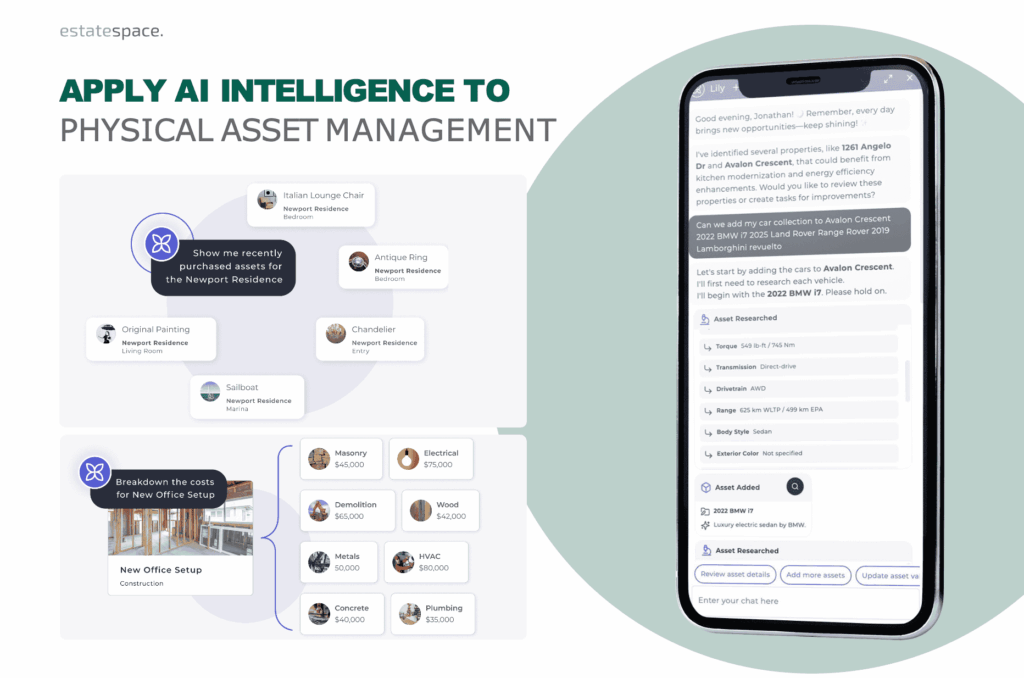AI Property Maintenance Assistant: Stop Losing 35% of Your Asset Value to Poor Maintenance
Your maintenance team spends 18 hours weekly just coordinating tasks and updating spreadsheets. Meanwhile, critical inspections slip through cracks, emergency repairs drain budgets, and assets deteriorate faster than they should. An AI property maintenance assistant changes this reality by automating what consumes your time and predicting what threatens your assets.
The data is stark: poorly managed maintenance shortens asset lifespans by up to 35%. For family offices and estate managers still relying on manual tracking, this represents millions in lost value—value that intelligent automation protects.
The Hidden Cost of Manual Maintenance Management
Think about what happens when your facilities manager leaves. Years of vendor relationships, maintenance histories, and operational knowledge walk out the door. The replacement starts from scratch, repeating mistakes already solved, missing context that prevents problems.
Research on operational challenges shows that fragmented systems and manual processes create inherent risks including missed maintenance requirements and inadequate documentation—problems that compound over time. Four Family Office Trends to Watch in 2025
This knowledge loss compounds the time drain. According to McKinsey’s 2023 facilities management research, most professionals spend nearly 18 hours weekly on coordination and record-keeping. That’s 45% of their work week managing information instead of managing assets strategically.
How an AI Property Maintenance Assistant Transforms Operations
The shift from reactive to proactive maintenance requires visibility you can’t achieve manually. An AI property maintenance assistant provides this by:
Automated Schedule Intelligence No more calendar reminders that someone has to create, track, and update. The system knows when your HVAC needs servicing, when roof inspections are due, when pool equipment requires attention. It schedules automatically based on manufacturer specs, actual usage patterns, and historical performance.
Predictive Failure Prevention Rather than waiting for equipment to break, AI analyzes patterns indicating imminent failure. That compressor showing subtle efficiency drops? The system flags it before it fails during a heat wave. Those minor roof leaks detected during inspection? Prioritized before they become emergency repairs costing 4-10 times more.
Institutional Knowledge Preservation Every vendor interaction, every maintenance decision, every repair outcome gets documented and contextualized. When staff transitions happen, the AI property maintenance assistant transfers knowledge seamlessly. New team members inherit years of operational intelligence, not empty spreadsheets.
Compliance Automation Safety inspections, regulatory requirements, insurance mandates—the system tracks them all. You receive alerts before deadlines, with documentation proving compliance. No more scrambling when auditors arrive or policies renew.
Measurable Outcomes from Intelligent Maintenance Systems
The transformation shows up in metrics that matter:
- 42% fewer unexpected equipment failures – predictive alerts prevent most emergency situations
- 28% lower maintenance costs – prevention costs far less than emergency repairs
- 23% longer asset lifespan – proper care extends the useful life of expensive equipment
- 20% boost in team productivity – automation eliminates administrative burden
- 82% less manual data entry – AI handles documentation automatically
- 58% quicker response times – issues get identified and assigned instantly
- 37% more accurate budgeting – historical data and predictive models improve forecasting
One estate managing three properties reduced annual maintenance costs from $485,000 to $349,000—not by cutting corners, but by preventing problems before they escalate.
The Real Cost of Staying Manual
Continuing with spreadsheets and reactive maintenance creates compounding problems:
Lost Asset Value Equipment that should last 15 years fails at 10 because maintenance intervals were missed or improperly executed. That $200,000 HVAC system needs premature replacement. The pool resurfacing happens years early because minor issues went unaddressed.
Emergency Premium Reactive repairs cost 4-10 times more than planned maintenance. The emergency service call, expedited parts, overtime labor—all avoidable with proper scheduling. Plus the inconvenience when systems fail during use.
Compliance Exposure Missing safety inspections or regulatory requirements creates liability. One incident can trigger lawsuits, insurance claims, even criminal penalties in extreme cases. The AI property maintenance assistant eliminates this risk through automated tracking.
Team Burnout Coordinating vendors, tracking tasks, updating records, responding to emergencies—it’s exhausting. Your best people leave for roles where technology handles the administrative burden, allowing them to focus on strategic work.
Purpose-Built AI Maintenance for High-Value Properties
EstateSpace’s Lily represents this evolution. Unlike generic facility management software designed for commercial buildings, Lily understands the unique requirements of private estate management.
Intelligent Asset Profiling Drop in equipment manuals, warranty documents, installer contacts—in any format. Lily extracts relevant details and creates comprehensive asset profiles automatically. What used to take days happens in minutes.
Smart Schedule Generation Based on manufacturer recommendations, climate conditions, usage patterns, and regulatory requirements, the AI property maintenance assistant generates optimal maintenance schedules. It adjusts automatically when conditions change.
Vendor Coordination The system knows which vendors handle which systems, their performance history, current availability. When maintenance is due or issues arise, Lily coordinates scheduling and tracks completion—no manual follow-up required.
Predictive Intelligence By analyzing maintenance histories and performance data, Lily identifies patterns indicating future problems. Equipment showing degradation gets flagged before failure occurs, enabling planned intervention instead of emergency response.
Early adopters see ROI within eight months, with some achieving 250% returns in the first year through reduced emergency costs and extended asset lifespans.
Integration with Property Operations
The AI property maintenance assistant doesn’t operate in isolation. It connects with your broader estate management workflows:
- Project Management: Seamlessly transition from construction to ongoing maintenance with complete documentation transfer
- Financial Systems: Integration with accounting platforms for accurate expense tracking and budget forecasting
- Insurance Management: Automated documentation supports claims and proves proper asset care for premium optimization
- Succession Planning: Complete maintenance histories and operational procedures transfer with the property
This integrated approach matters when you’re managing multiple properties with complex operational requirements.
Who Benefits Most
Family Offices: When you’re managing multiple estates across different climates and jurisdictions, coordinating maintenance becomes exponentially complex. The AI property maintenance assistant provides unified oversight while respecting each property’s unique requirements.
Estate Managers: When your reputation depends on properties running flawlessly, you can’t afford missed maintenance or emergency failures. Intelligent automation ensures nothing falls through cracks while freeing you for strategic initiatives.
Asset Managers: When clients expect institutional-grade oversight of their properties, manual tracking falls short. AI-driven maintenance demonstrates sophistication that justifies premium service fees.
Property Owners: When you’ve invested millions in assets, proper maintenance protects that investment. The AI property maintenance assistant ensures your properties appreciate rather than deteriorate.
The Path Forward
The question isn’t whether to adopt intelligent maintenance systems—it’s how soon you make the transition. Properties managed with AI assistance are:
- Appreciating in value through proper care
- Operating with lower total costs
- Avoiding emergency disruptions
- Maintaining institutional knowledge through transitions
- Demonstrating compliance automatically
Meanwhile, properties relying on manual processes are losing value daily, experiencing more failures, and creating liability exposure.
See how AI maintenance works for your specific properties →
Or explore the complete estate management platform that unifies maintenance with broader property operations. No generic facility management software—this is purpose-built for high-value private estates.
Related Resources:






